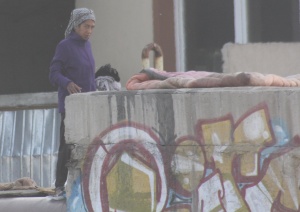Maine primesc si medalie…Aici intentia mea de discurs – habar nu am daca o sa ma lase sa zic ceva dar macar am scris ceea ce as vrea sa zic…
Super ! – m-am scos si am devenit Cetatean European. Barosanul cel mare de la Parlamentul de Domni si Doamne de la Bruxelles m-a miruit in lumea buna a europenilor si a dat mana cu mine.
Sa mai spuna cineva ca nu exista solutii functionale pentru incluziunea sociala a romilor!
Uite ca exista si eu sunt o dovada – inca vie. Unul cate unul putem sa devenim cetateni europeni! E drept ca in ritmul asta o sa ne ia cateva milioane de ani sa intram si noi in randul lumii – si asta in cazul in care nu ne inmultim, asa cum le e teama multora dintre concetatenii mei.
Pe de alta parte eu nu am decat un copil , deci nu sunt o amenintare- putem sa fim prieteni.
Si culmea este ca am fost propus de un austriac pentru premiul asta. La inceput am crezut ca poate este anti-lebede si asa s-a gandit sa-mi multumeasca. Apoi am aflat ca stia ca povestea cu lebedele a fost imaginata de niste jurnalisti amabili si iubitori de romi.
M-am tot gandit: de ce am primit eu premiul ?
Stiti cum toti marlanii care vor sa isi justifice rasismul impotriva oricui se scot si devin oameni respectabili spunand ca au un prieten apropiat care fie e negru, fie tigan sau gay, dupa nevoie ?
Ei, uite asa ar putea sa fie si cu premiul asta: Europa a rezolvat problema cu rasismul institutional impotriva romilor. Avem noi Cetatean European rom ? Avem! Ce ne mai plangem ?
Anul acesta am mai avut, ca romi, cateva mari realizari. Si aici nu includ faptul ca ne-am procopsit cu doi regi. Unul dintre romii nostri si in acelasi timp unul dintre cei mai buni sociologi romani , cea mai curioasa si inteligenta minte pe care am cunoscut-o, a devenit cel mai mediatizat roman.
Stati linistiti, ca nu a ajuns nici in Parlamentul European pentru ca nu a fost fiul presedintelui si nu a ajuns nici vreo scula prin Comisia Europeana. Nici rubedenie sau amic cu vreun baron local sau prim-ministru. Si nu e nici Gigi Becali .
De fapt, in ultimii 7 ani, in ciuda faptului ca Nicolae Gheorghe era considerat cel mai bun specialist pe problematica romilor din Europa, ca avea un CV absolut impresionant, ca vorbea 5 limbi fluent si mai intelegea inca vreo doua, a fost practic somer.
A ajuns in schimb in The Economist.
Pentru un necrolog.
In acesti 7 ani tot felul de tampiti anonimi au fost numiti in pozitii care mai de care mai importante. De exemplu, cucoana care e Comisara Europeana si se ocupa si de problematica romilor vede romi doar in filme sau in conferinte. Cand a fost sfintita in postul de Comisara avea zero experienta pe problematica roma si cu mult bun simt si-a angajat un cabinet de aproape 20 de specialisti dintre care niciunul nu are experienta practica sau academica pe acest subiect. In plus, Domnia sa vine din singura tara din Europa care nu are romi. Urmarind aceasi logica, sefa Departamentului pe Romi din cadrul Directoratului condus de ea este din Cipru si are aceleasi calificari fabuloase ca si Cucoana Comisar.
Institutiile Uniunii Europene sunt din ce in ce mai disfunctionale si ineficente. Felul in care sunt gandite proiectele finantate de banii europeni distrug societatea civila si stimuleaza coruptia, nepotismul si minciuna.
Cheltuim marea majoritate a banilor publici alocati combaterii saraciei pe conferinte inutile in hoteluri de 4 sau 5 stele si pe rapoarte pe care in cel mai bun caz le citesc cei care deja stiu despre ce e vorba si care nu au putere de decizie.
Uniunea Europeana este o idee senzationala si un proiect care ne-a asigurat cea mai lunga perioada de pace si prosperitate din istoria Europei. Asta nu inseamna ca este justificabila sau de ajutor cultura aplaudaca ( un eufemism) amestecata cu aroganta si o rigiditate ingrozitoare a birocratiei europene.
Felul in care functioneaza Comisia Europeana si o buna parte a agentiilor europene incluzand Agentia pentru Drepturile Fundamentale in acest moment este impotriva proiectului European.
Parlamentul Europei este probabil cea mai buna dovada a bunei functionari a nepotismului, mai ales in ceea ce priveste Europa de Est.
Daca vom continua asa, singura sansa ca peste 10 -20 de ani sa citesc ceva pozitiv despre Uniunea Europeana, in afara discursurilor sforaitoare si adesea megalomanice ale functionarilor europeni, va fi in The Economist.
Tot pentru un necrolog.
Cred ca suntem responsabili sa nu ingropam Proiectul European. Si sper ca ceea ce scriu si fac, desi adesea nu prea confortabil sau politicos, va ajuta la insanatosirea sistemului european. Si premiul asta il consider o incurajare de a continua.
PS. Cateodata (rar) fac greseli gramaticale. In acel moment legatura intre mine si Fane Spoitoru’ se restabileste solid in capul oricaruia care se crede genetic superior romilor. Nu conteaza cat de agramati sau batuti in cap sunt cei in cauza – superioritatea genelor lor devine brusc evidenta si se manifesta vanjos. Cel mai tare a fost un nene care dupa ce i-am bagat elegant un ”astia” in loc de acestia mi-a spus- “ domnu’ Nicolae sunteti ca toti tiganii -cam anagramat “. Folosesc un pic mai des “astia” de atunci…



